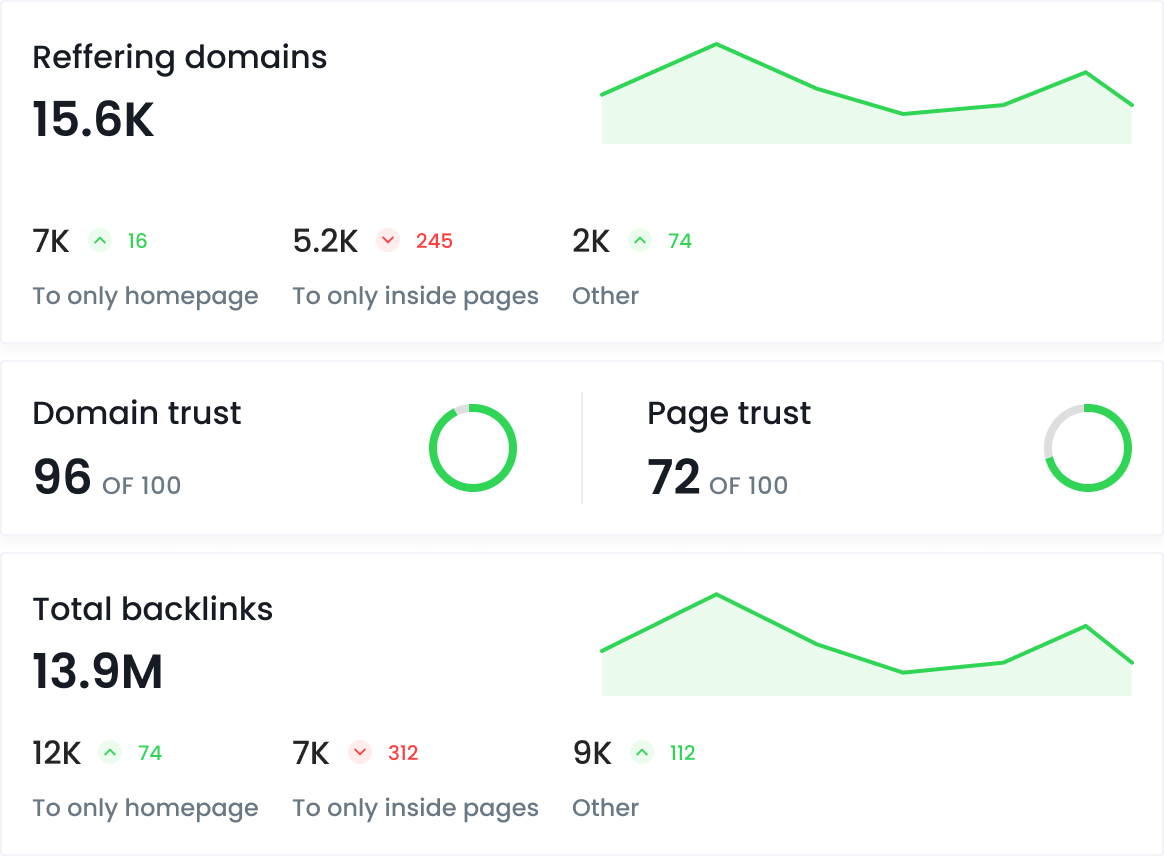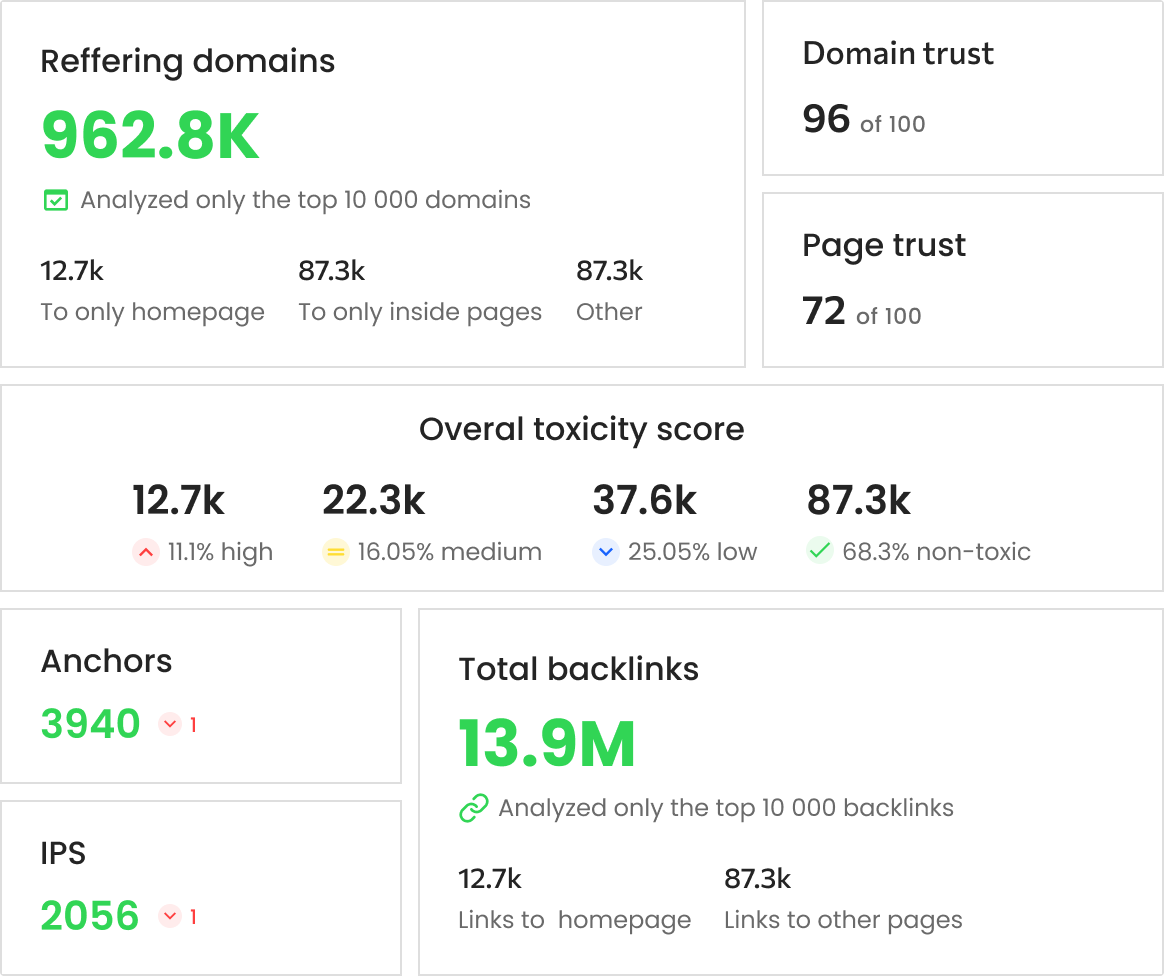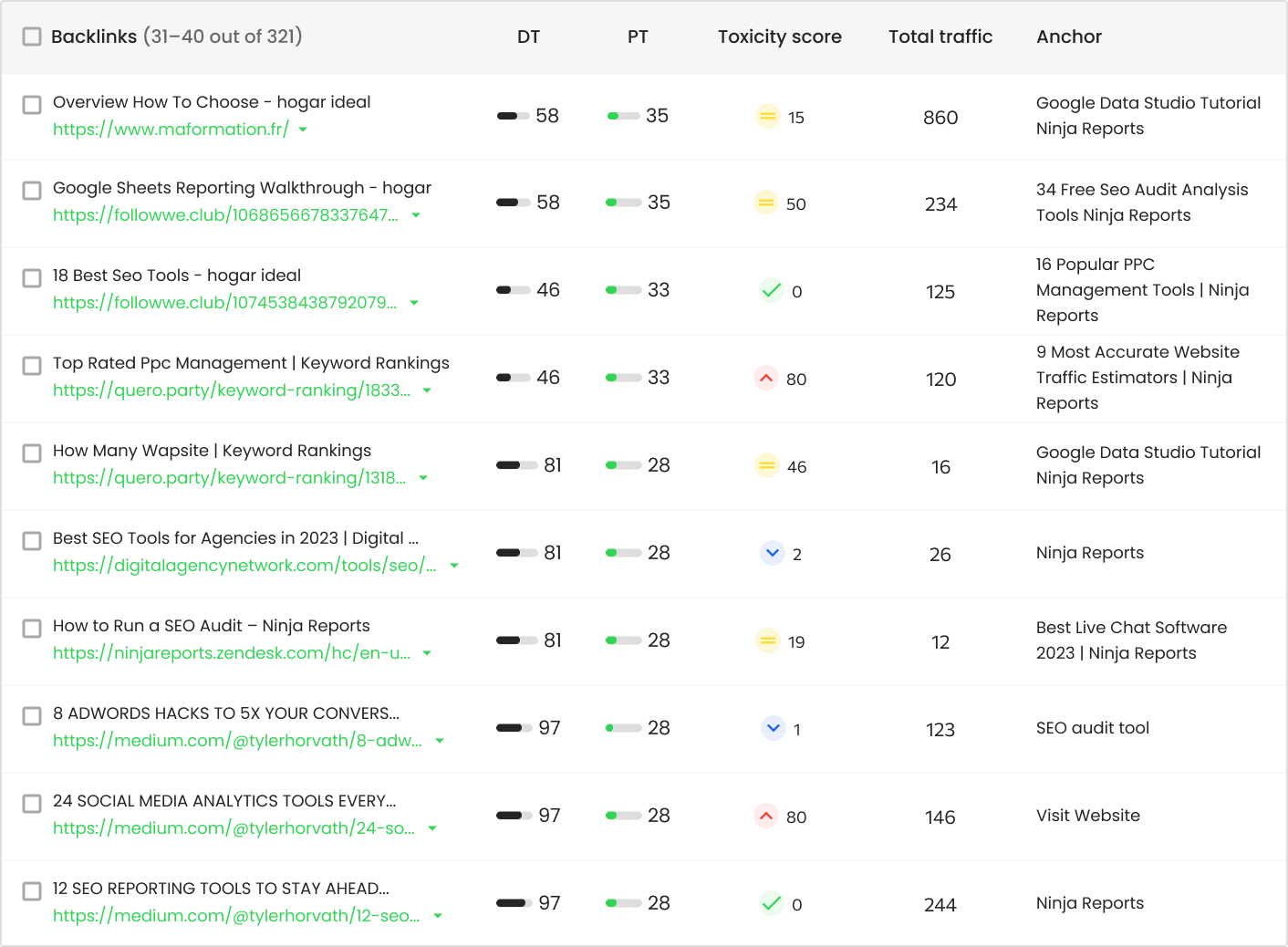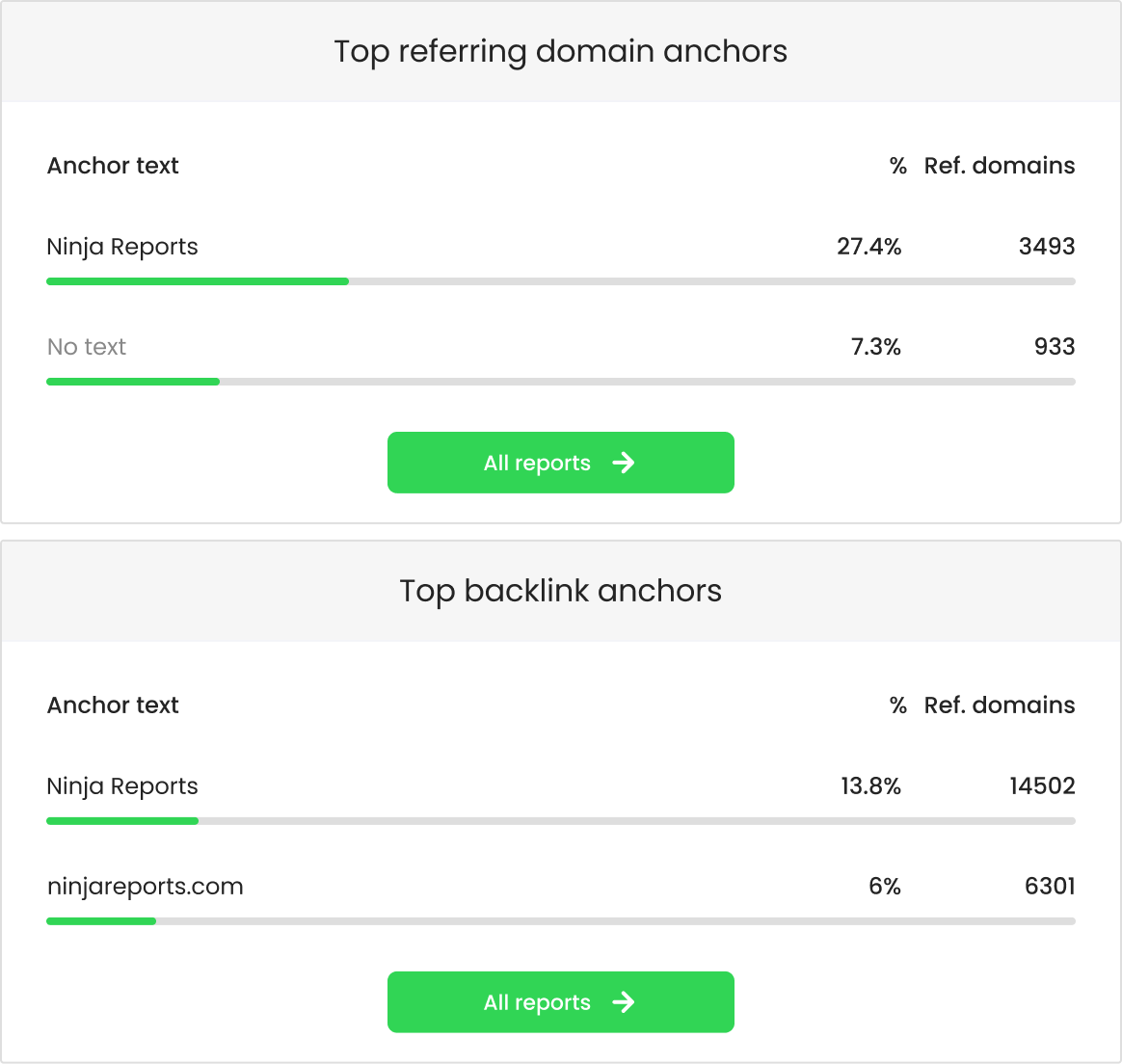Backlink Checker Tool
Step up your backlink game with the Backlink Checker, brought to you in collaboration with our partners at SE Ranking. Explore, analyze, and optimize your backlink profile for maximum impact!

Unleash the power of the advanced SEO Backlink Checker
Discover every backlink and referring domain pointing to your website or any other , along with anchor texts, target pages, domain and page trust scores, link types, and more. Analyze the dynamics of acquiring backlinks and referring domains and evaluate your progress. Use data from the Backlinks Checker to optimize your backlink strategy and stay ahead of the competition.
- Over 3 trillion backlinks indexed
- More than 262 million domains indexed
- Daily crawling of 7 billion pages
Leverage the power of this rapidly expanding database to uncover valuable linking opportunities and ensure you have the most up-to-date and comprehensive insights for your backlink analysis needs.
Analyzing backlinks becomes a breeze with visually appealing graphs, charts, and tables. The tool helps you understand and interpret complex data easily, identify trends, and track progress effortlessly. The user-friendly data presentation enhances the overall experience, allowing you to derive actionable insights from the comprehensive backlink analysis clearly and intuitively.
Embrace the bird’s eye view of your backlink landscape
The Overview dashboard in the Backlink Checker provides a comprehensive snapshot of your backlink situation. At a glance, you can assess crucial metrics like Domain Trust and Page Trust, which predict search engine rankings, and gain insights into the total number of referring domains and backlinks, their distribution across your website’s pages, the ratio of dofollow and nofollow links, and anchor texts.
The clickable tabs provide seamless navigation to detailed sections for in-depth analysis. Interactive graphs showcase the growth of referring domains and backlinks, while tables reveal commonly used anchor texts. With these features, you can analyze your SEO efforts and adjust your backlink strategy accordingly.
Embrace the bird’s eye view of your backlink landscape

Unveil backlink details with ease
Explore every found backlink effortlessly with the Active Backlinks dashboard. Gain valuable insights by accessing a comprehensive list of backlinks with critical information for each. See how backlinks are distributed across the homepage and other pages, analyze the number of unique IP addresses and referring domains, and the breakdown of dofollow/nofollow links.
Review the table for a thorough examination of each backlink, revealing its source URL, anchor text, target URL, backlink type, Domain Trust, Page Trust, and first and last seen dates. Analyze and optimize your backlink efforts like never before with powerful insights on active backlinks.
Unveil backlink details with ease

Investigate the language of backlinks
Research the language and patterns behind the anchor texts used in the backlinks and referring domains using the Anchor Texts dashboard. Discover the most common anchor texts along with the number and shares of referring domains and backlinks associated with each one.
For a deeper analysis, use convenient filters to sort anchor texts based on word count, referring domains, backlinks, and dofollow links. Click on metrics to access a list of domains or backlinks associated with specific anchor texts, allowing you to investigate and assess your backlink profile health further. Leverage anchor text insights to cultivate a balanced backlink profile.
Investigate the language of backlinks

Flexible pricing plans tailored for your SEO success
Pick the best plan for you or request a custom one, and unlock the best value for your investment
Essential
For freelancers seeking to boost their SEO efforts without breaking the bank.
PRO
For small teams aiming to supercharge their SEO and grow traffic substantially.From
Business
For agencies striving to drive exceptional SEO results for multiple clients.
Client stories that inspire confidence
Hear what happy customers have to say about Backlink Checker
Revolutionize your SEO strategy with Backlink Checker
Understanding the role of backlinks is crucial for building robust SEO strategies and achieving online success. This is where the Backlink Checker tool comes into play. Its advanced capabilities and comprehensive data empower SEO specialists and agencies to harness the power of backlink analysis, make informed decisions, improve website rankings, and drive remarkable results.
What is the SEO Backlink Checker?
The Backlink Checker is a powerful SEO tool that allows you to analyze and evaluate the backlinks pointing to a specific website or URL. It provides insights into the quality and quantity of backlinks, helping you understand the overall backlink profile and how it impacts rankings.
With the Backlink Checker, you can discover backlinks, referring domains, anchor texts, domain trust metrics, and other essential data to assess the authority and credibility of a website. This tool enables you to identify opportunities for link building, improve your backlink profile’s health, and choose the right strategies to boost your website’s SEO performance.
Backlink Checker helps anyone engaged in SEO
Website Backlink Checker caters to a wide range of users. It serves as an indispensable resource for:
- SEO specialists: With in-depth information on backlinks’ quality, quantity, and diversity, SEO specialists can assess the authority and credibility of a website, identify potential issues, and devise strategies to enhance organic rankings.
- Digital and SEO agencies: Agencies managing multiple client websites can leverage the Backlinks Checker Tool to provide outstanding value to their clients. By analyzing the backlink profiles of client websites and monitoring backlink trends, agencies can offer data-backed recommendations for improving link profiles, optimizing anchor texts, and enhancing overall search visibility.
- Website owners: With valuable insights into the health and quality of their backlink profiles, website owners can take control of their backlink strategies. By understanding the backlink landscape, they can identify opportunities for link building, monitor the health of their backlink profiles, proactively protect against toxic backlinks, enhance their online presence, and attract organic traffic.
Why is using the Backlink Checker a must?
Backlink Checker goes beyond superficial metrics by providing a holistic view of the backlink profile. You can find out how many backlinks a site has, which sites those links come from, which pages they lead to, and which anchor text they use. You can see the new links and referring domains the website acquired during last week, month, three months, half a year, or year and those which you lost.
Some key advantages of the online Backlink Checker are:
- Analyzing competitive backlink profiles. By understanding the strategies employed by top-ranking websites in their niches, SEO specialists can uncover valuable insights, identify gaps, and develop more effective optimization strategies for themselves and their clients.
- Identifying link-building opportunities. By analyzing the backlink profiles of authoritative websites in related industries, SEO specialists can uncover potential linking prospects and formulate outreach campaigns to acquire high-quality backlinks.
- Assessing backlink health. SEO specialists can promptly identify link-related issues by regularly analyzing the quality, quantity, and relevancy of backlinks. This proactive approach helps to maintain a healthy backlink profile, ensuring sustained organic rankings.
- Checking backlink growth. The tool lets you keep a close eye on the development of your backlink profile. You can see new and lost backlinks, and analyze overall growth patterns to measure the effectiveness of your link-building efforts.
Making informed backlink decisions is the key to success
Data-driven decision-making allows SEO specialists and agencies to navigate the complexities of backlink analysis with precision and effectiveness. Backlinks Checker provides actionable and accurate data in a convenient format. With detailed insights, you can prioritize your backlink optimization efforts, allocate resources effectively, and focus on strategies that yield the best results.
FAQ
What are toxic backlinks?
Toxic backlinks are links from external websites that can harm a website’s rankings. These backlinks are typically associated with spammy, low-quality, or malicious websites. Toxic backlinks often exhibit unnatural link patterns, such as excessive links from unrelated websites or an unusually high concentration of keyword-rich anchor texts. These links can negatively affect a website’s online reputation and trigger search engine penalties.
What is a backlink profile?
A backlink profile is a collection of all the backlinks that point to a particular website. It plays a significant role in rankings and online visibility. Having a healthy backlink profile means that a website has many high-quality backlinks. But quality is more important than quantity. The authority, relevance, and trustworthiness of the linking websites determines the quality of backlinks. Backlinks from reputable and authoritative sites are more valuable.
How to find backlinks to a website?
You can use the Links report in Google Search Console to find all the backlinks that point to a website. It will show the top linked pages, sites, and linking texts. But the information is limited, and you can only check the website you have access to. The Backlink Checker provides a more convenient way to detect backlinks and more options for analysis. You can analyze any site or URL and get a complete picture and backlinks, referring domains, target pages, anchor texts, and all the essential backlink metrics in seconds.
How to find the website pages that get the most backlinks?
All you need to do is type your website address into the Backlink Checker and run a backlink analysis. Then, open the Pages tab. From there, you’ll see the URL addresses of the pages on your website that receive the largest number of backlinks and have the largest number of referring domains. This information will help you understand which pages are the most popular and which still need to be worked on.
Why are anchor texts important?
Anchor texts provide context and relevance to the linked content. Good anchors accurately reflect the linked page’s content, use different variations of your target keywords, and fit naturally within the content on the referring page. By analyzing anchor texts, you can ensure they are optimized with relevant keywords related to the linked page and that the backlinks you get are natural.

